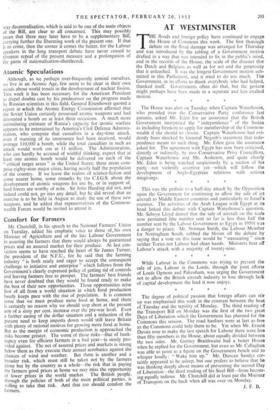Comfort for Farmers
Mr. Churchill, in his speech to the National Farmers' Union on Tuesday, added his emphatic voice to those of, his own Minister of Agriculture and of the late Labour Government in assuring the farmers that there would always be guaranteed prices and an assured market for their produce. At last con- viction seems to have reached the heart of Sir James Turner, the president- of the N.F.U., for he said that the farming industry "is both ready and eager to accept the consequent challenge to initiative and enterprise" which follows from the Government's clearly expressed policy of getting rid of controls and leaving farmers free to prosper. The farmers' best friends have never doubted that they would be found ready to make the best of their new opportunities. Those opportunities arise first of all from a world situation in which food production barely keeps pace with the rise of population. It is common sense that we must produce more food at home, and there is certainly no reason why we should stop short at the present aim of a sixty per cent. increase over the pre-war level. Even a further easing of the dollar situation and a reduction of the present need to keep imports down would still leave Britain with plenty of rational motives for growing more food at home. But as the margin of economic production is approached the risks become greater. The worst of those risks—that of bank- ruptcy even for efficient farmers in a bad year—is surely pro- vided against. The net of assured prices and markets is strong below them as they execute their annual acrobatics against the chances of wind and weather. But there is another and a broader risk, which must still be taken not by the farmers alone but by the country as a whole—the risk that in paying the farmers good prices at home we may miss the opportunity of lower prices in the world market. The British people, through the policies of both of the main political parties, is willing to take that risk. And that too should comfort the farmers.


































 Previous page
Previous page